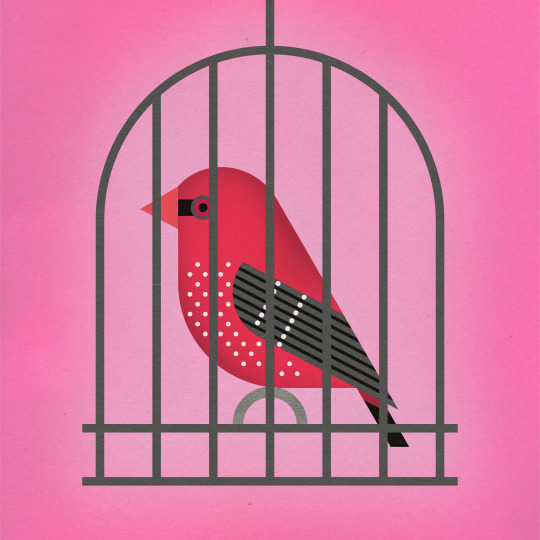#munias
Explore tagged Tumblr posts
Text
BOTD: Red Avadavat

Photo: Hari K Patibanda
"Strikingly pretty small finch. Males are largely red and covered in white spots with dark wings and tail. Females are gray with a rufous rump. Both sexes have a red beak. Gives a very musical song a high 'teei' call. Found in grassy areas close to water and often near human habitation, particularly areas with wet rice paddies."
- eBird
#native to asia but introduced in a few places to the americas!#birds#red avadavat#birds of north america#north american birds#strawberry finch#strawberry munia#red munia#finches#estrildid finches#munias#passerines#birds of the us#birds of the caribbean#birding#bird watching#birdblr#birblr#bird of the day#Amandava amandava
112 notes
·
View notes
Text

Red Avadavat aka Red Munia aka Strawberry Finch (Amandava amandava), male, family Estrildidae, order Passeriformes, India
photograph by Arulanandham Palanisamy
789 notes
·
View notes
Text

Ocean separates lands, not souls.
-- Munia Khan
(Gibraltar)
#ocean#soul#distance#munia khan#travel photography#gibraltar#separation#quote#closeness#missing you#thoughts#photography#spain#uk
243 notes
·
View notes
Quote
Patience is to wait for the ice to melt instead of breaking it.
Munia Khan
#Munia Khan#quotelr#quotes#literature#lit#breaking#ice#melt#melting#patience#patient#patient-in-life#snow#wait#waiting#wisdom#wisdom-quotes#wise-words
110 notes
·
View notes
Text

August 18, 2024 - Gray-banded Munia or Grey-banded Mannikin (Lonchura vana) These estrildid finches are found in grasslands, marshes, and the edges of cultivated areas in a small range in northwestern Papua, Indonesia. Their diet is unknown but they have been observed foraging in flocks on low weeds in abandoned agricultural areas. Nothing is known about their breeding behavior. They were previously classified as Vulnerable by the IUCN but have been found to be more common than once thought.
#grey-banded munia#gray-banded mannikin#estrildidae#lonchura vana#bird#birds#illustration#art#grassland#water#birblr art
56 notes
·
View notes
Quote
Our souls are always looking for love, and hearts wait to treasure it.
Munia Khan
#quotes#Munia Khan#thepersonalwords#literature#life quotes#prose#lit#spilled ink#always#heart#hearts#love#love-quote#loving#philosophy-of-heart#soul#soul-quotes#souls#souls-quotes#spiritual#spirituality#treasure#wait#waiting
44 notes
·
View notes
Text

Day 10 of #birdtober2023 from @aholmesartstudio is Strawberry Finch
189 notes
·
View notes
Text

Spring is the fountain of love for thirsty winter.
春は渇きの冬のための愛の���である。
Munia Khan ムニア・カーン
109 notes
·
View notes
Text

[2195/11080] Chestnut munia - Lonchura atricapilla
Order: Passeriformes Suborder: Passeri Superfamily: Passeroidea Family: Estrildidae (estrildid finches)
Photo credit: Floyd Bermejo via Macaulay Library
#birds#Chestnut munia#Passeriformes#Passeri#Passeroidea#Estrildidae#Lonchura#birds a to z#undescribed
118 notes
·
View notes
Text

245. White-Headed Munia
#todays bird#birdblr#artists on tumblr#birds#bird of the day#bird#White-Headed Munia#requested by#rembrqndtswife
55 notes
·
View notes
Text






altered by munia khan (from fireclay) // schiaparelli 2023 crystal ants skirt // "an interview with e. o. wilson, the father of the encyclopedia of life" with david pogue and e. o. wilson // un chien andalou dir. salvador dalí // as meat loves salt by maria mccann // joan collins in empire of the ants dir. bert i. gordon
#web weave#web weaving#ant#ants#munia khan#schiaparelli#e. o. wilson#david pogue#poetry#fashion#film#un chien andalou#salvador dali#surrealism#surrealist#as meat loves salt#maria mccann#joan collins#empire of the ants#bert i. gordon#salvador dalí#i need to add more color/red#mine
26 notes
·
View notes
Text
BOTD: Scaly-breasted Munia

Photo: Raghunath Thirumalaisamy
"Native to southern Asia, this small waxbill is a popular cagebird. Escapees from captivity have established wild populations in several parts of the world. The species is now widespread and common in coastal California, from San Jose to San Diego, and other local populations are established around Houston, Texas, at a few spots farther east along the Gulf Coast, and in southern Florida. Usually seen in flocks."
- Audubon Field Guide
#birds#scaly breasted munia#scaly breasted waxbill#birds of north america#north american birds#waxbills#munias#finches#estrilidid finches#passerines#birds of the us#birds of the caribbean#birding#birdblr#birblr#bird watching#bird of the day#Lonchura punctulata
32 notes
·
View notes
Text

Red Avadavat aka Strawberry Finch aka Red Munia (Amandava amandava), family Estrildidae, order Passeriformes, Karnataka, India
photograph by Devadatha Kumar SR
808 notes
·
View notes
Photo

Red Avadavat
470 notes
·
View notes
Text
" Scaly-Breasted Munia " //© Ayush Singh
Music: A.R. Rahman, Unni Menon, Sujatha Mohan - Pudhu Vellai Mazhai
#India#nature#Portraits#Wildlife#Birds#Scaly-Breasted Munia#4K#8K#12K#fpv#reels#aesthetics#wanderlust#explore#follow#discover
91 notes
·
View notes
Text

October 27, 2024 - Gray-headed Munia or Grey-headed Mannikin (Lonchura caniceps) Found in parts of eastern Papua New Guinea, these estrildid finches live in grasslands, savannas, wetlands, and grassy cultivated areas. They eat grass seeds, foraging in flocks on the ground and while perched on seeding grass stems. Sometimes breeding in colonies, they build rounded nests from grass leaves, fine stems, and seedheads in shrubs, trees, or clumps of grass. Females lay clutches of four to six eggs.
44 notes
·
View notes